Erika H. James, Dean of the Wharton School of the University of Pennsylvania and a member of the Advisory Board of Tsinghua University's School of Economics and Management (Tsinghua SEM), engaged in a wide-ranging dialogue with Tsinghua faculty and doctoral students on October 17, 2025.
The discussion centered on the pivotal themes "Thriving in an Academic Institution with Multifaceted Paths" and "Embracing the AI Era." The session was hosted by Zhang Chen, Associate Professor in the Department of Leadership and Organization Management and Assistant Dean at Tsinghua SEM.
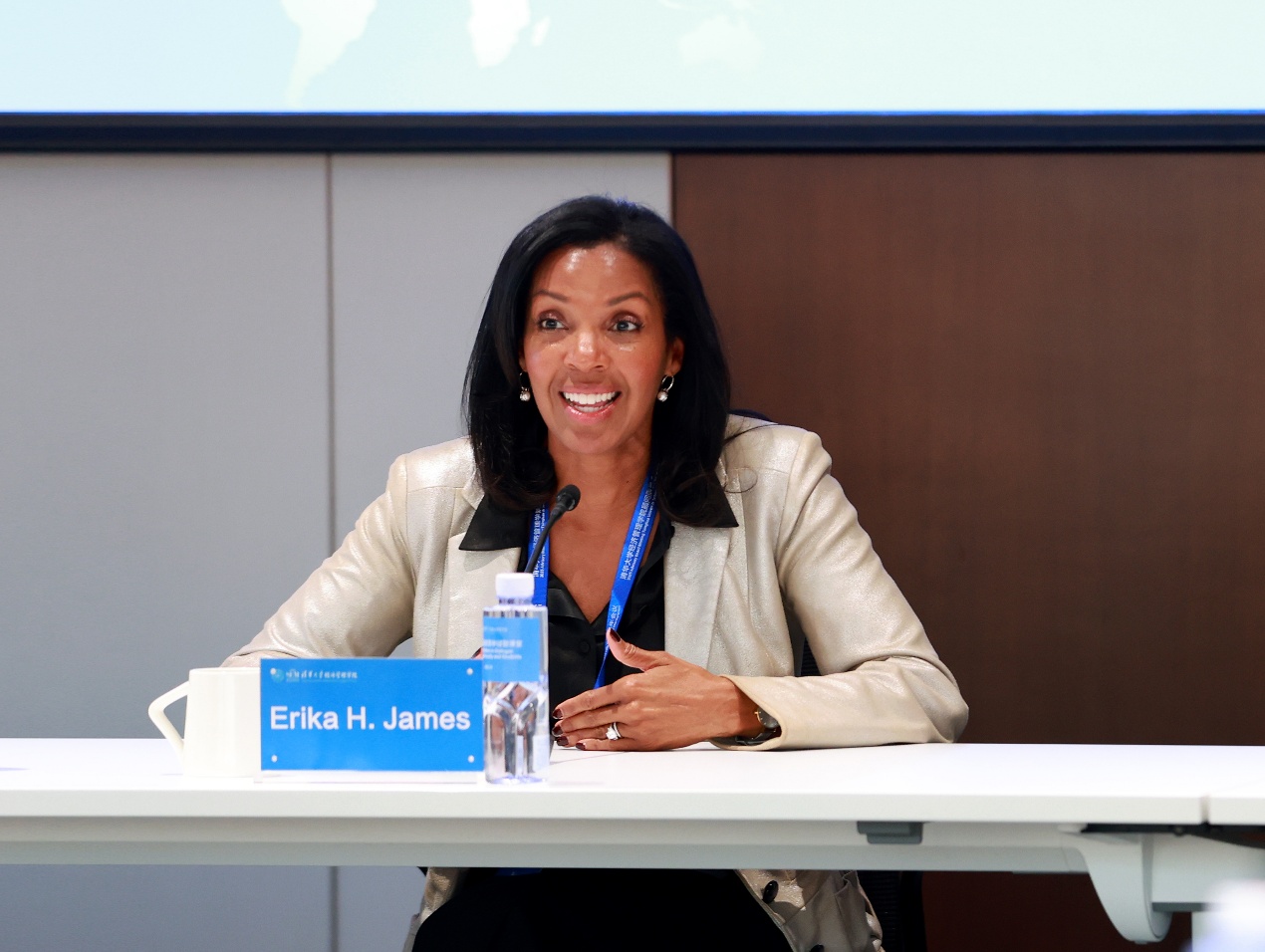
Erika H. James in dialogue with Tsinghua faculty and students
James first shared her perspectives on faculty development paths within business schools, drawing from her extensive experience at several top-tier institutions. She emphasized that successful schools operate with clear strategic goals and align their incentive systems accordingly. The key, she stressed, is for an institution to define its strategic priorities clearly and build a coherent system that provides clear developmental pathways for faculty with different strengths.
When discussing how young scholars should navigate their careers, James cited the example of two University of Pennsylvania faculty members who won a Nobel Prize for their groundbreaking mRNA research, despite early skepticism. "When you find an area of passion, a question you care deeply about, you have a duty to pursue it," she said, highlighting the potential of unconventional research to drive societal progress, while acknowledging the accompanying challenges. She noted that robust institutional support is vital for fostering innovative and high-risk research. This should include creating a culture that encourages exploration and tolerates failure, she said, as well as maintaining a sufficiently large and academically diverse faculty to provide a solid foundation and collaborative space for scholars on varied paths.
The conversation then shifted to the profound impact of artificial intelligence on business education and research. James highlighted Wharton's "AI & Analytics Initiative," sharing inspiring examples from across its key pillars. Under "AI for Students," she noted the launch of Wharton's "AI for Business" major. As part of "AI for Industry," she highlighted a partnership with Accenture, whereby Wharton faculty provide thought leadership to help consultants solve real-world client AI challenges. Regarding "AI for Society," she detailed an initiative through which Wharton faculty and students introduce AI to students in under-resourced schools in Philadelphia, helping to bridge the digital divide.
Addressing the new expectations students hold in the age of AI, James observed a central tension: balancing faculty autonomy over classroom AI policies with growing student demand for access to and instruction on these powerful tools. She also mentioned the ongoing exploration of using AI to enhance productivity in teaching assistance and grading.
James' advice for faculty adapting to this new era was two-fold: first, adopt a "self-starter" mindset by experimenting with AI in everyday contexts; and second, encourage the institution to provide structured professional development opportunities, such as workshops and expert seminars, to facilitate systematic learning. She also praised the invaluable internal knowledge-sharing among AI experts on the faculty at Wharton.
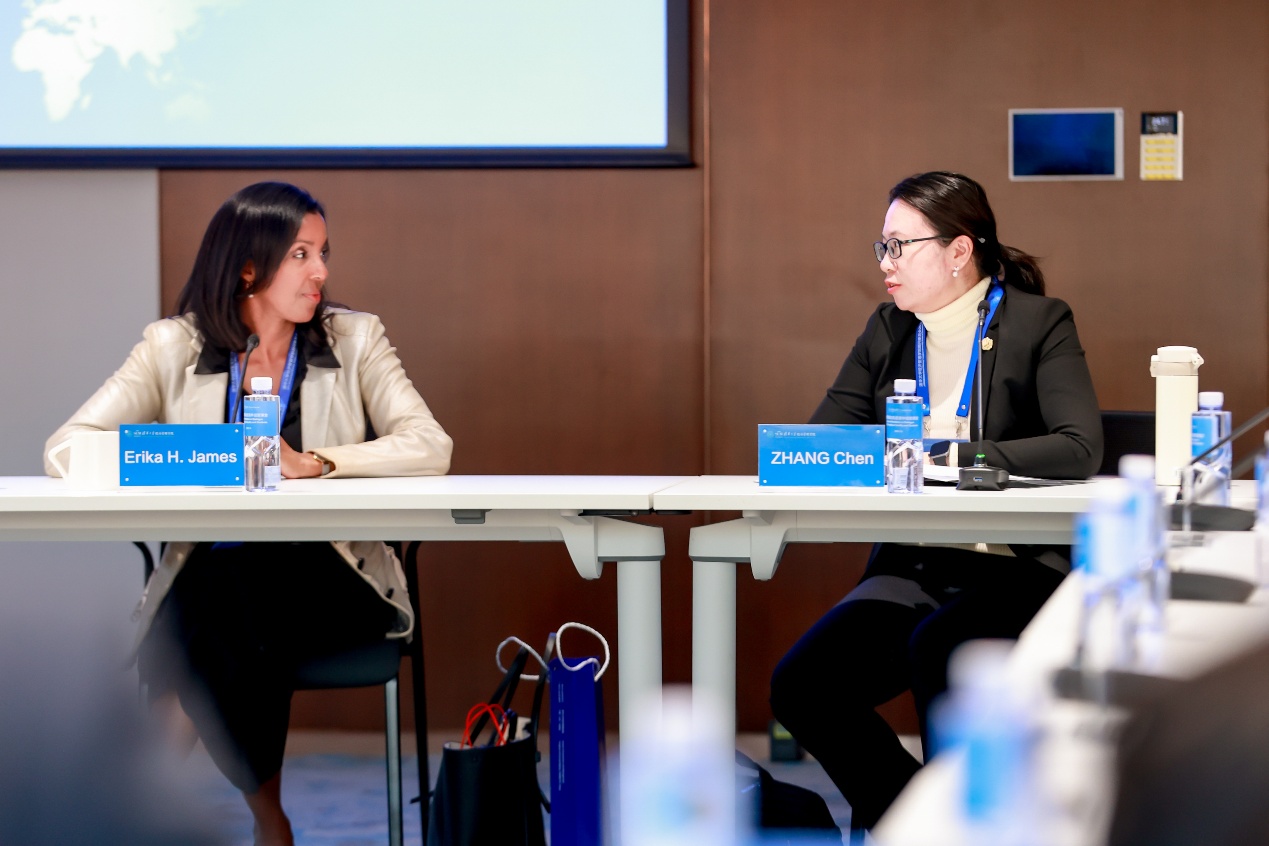
Erika H. James talks with Zhang Chen.
The open Q&A session featured exchanges on topics ranging from leadership and career transitions to the challenges and opportunities presented by AI. In response to a question about women advancing into tech leadership roles, James detailed Wharton's "Multidisciplinary Leadership Program," "Women's Leadership Program," and "Women on Corporate Boards" initiative, emphasizing the need for dedicated spaces and tailored programs to address women’s unique challenges and empower their career growth.
James used the analogy of "learning arithmetic before using a calculator" when asked about cultivating students' critical thinking in the AI era, stressing that mastering foundational principles is a prerequisite for effectively judging and utilizing AI outputs. She also acknowledged the universal challenge of balancing fundamental knowledge with new tool adoption within limited curricula.
When asked about the transition after promotion to full professor, James outlined a three-stage faculty career model. She noted that senior faculty bear greater institutional leadership and service responsibilities, which she said are vital for guiding a school's future and sustaining its excellence. On the links between research, teaching, and case development, she affirmed that excellent scholars integrate research insights into the classroom and business community "seamlessly," adding that the main challenge lies in institutional strategic prioritization rather than an inherent disconnect.
Addressing the key transition from doctoral student to junior faculty, she reflected on her experience of teaching executives at 25 and advised "giving yourself grace," noting that teachers do not need to know everything — the key is to learn to facilitate classes and draw out students' existing knowledge and experiences.
Asked about early-career researchers who feel their ideas are inadequate after reading top-tier journals, she countered, "You are likely the only one who thinks your ideas aren't good enough," and advised that great research ideas are not born perfect but evolve through sharing, discussion, and iterative feedback long before a paper is fully developed.
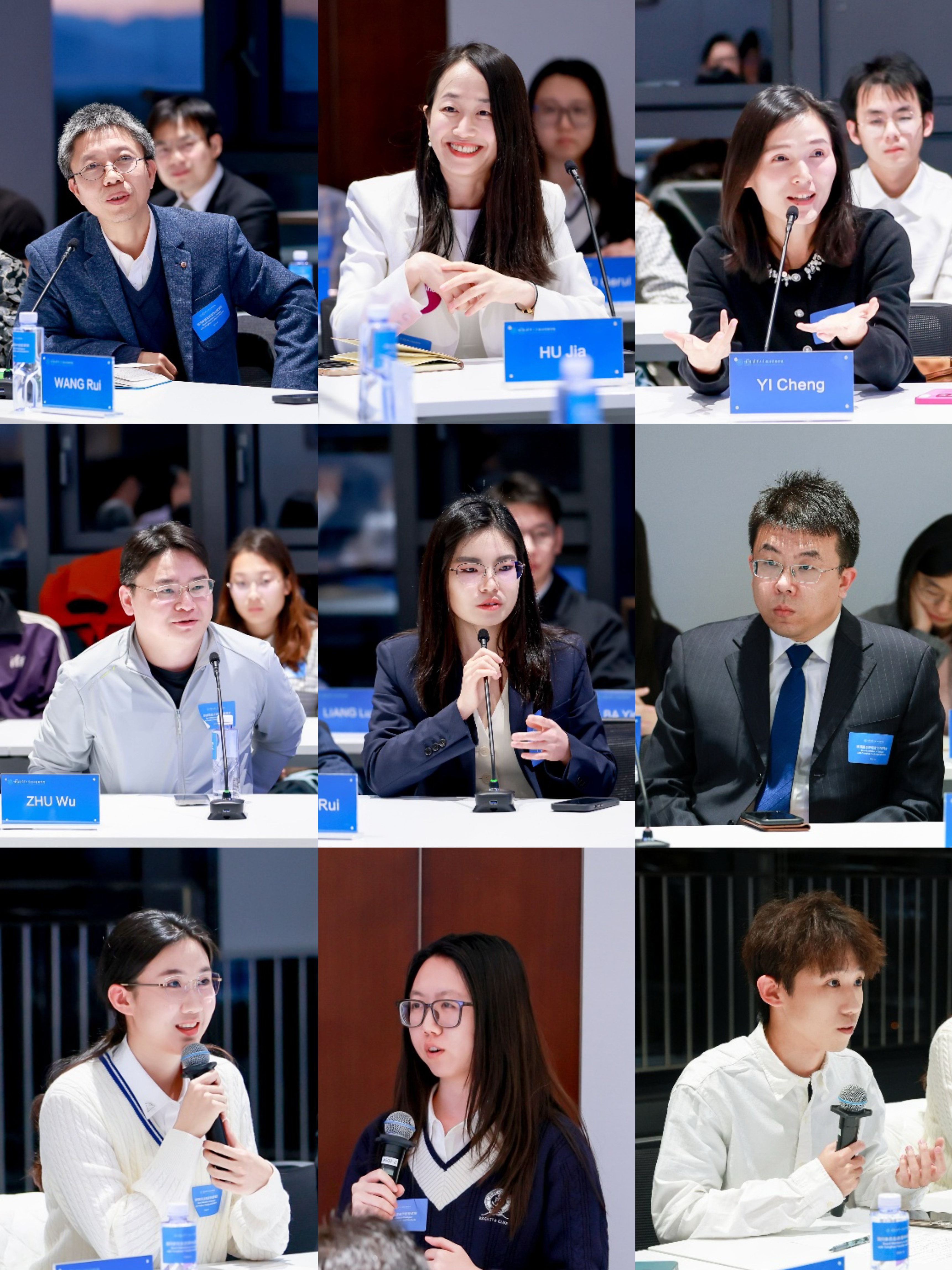
The Q&A Session
The dialogue concluded on a warm and personal note. As a token of appreciation, Tsinghua SEM presented James with a special gift – a portrait of her sketched live during the event by a student representative. James said she was deeply touched by the thoughtful gesture and praised the student's remarkable talent, cherishing the memento from her visit.
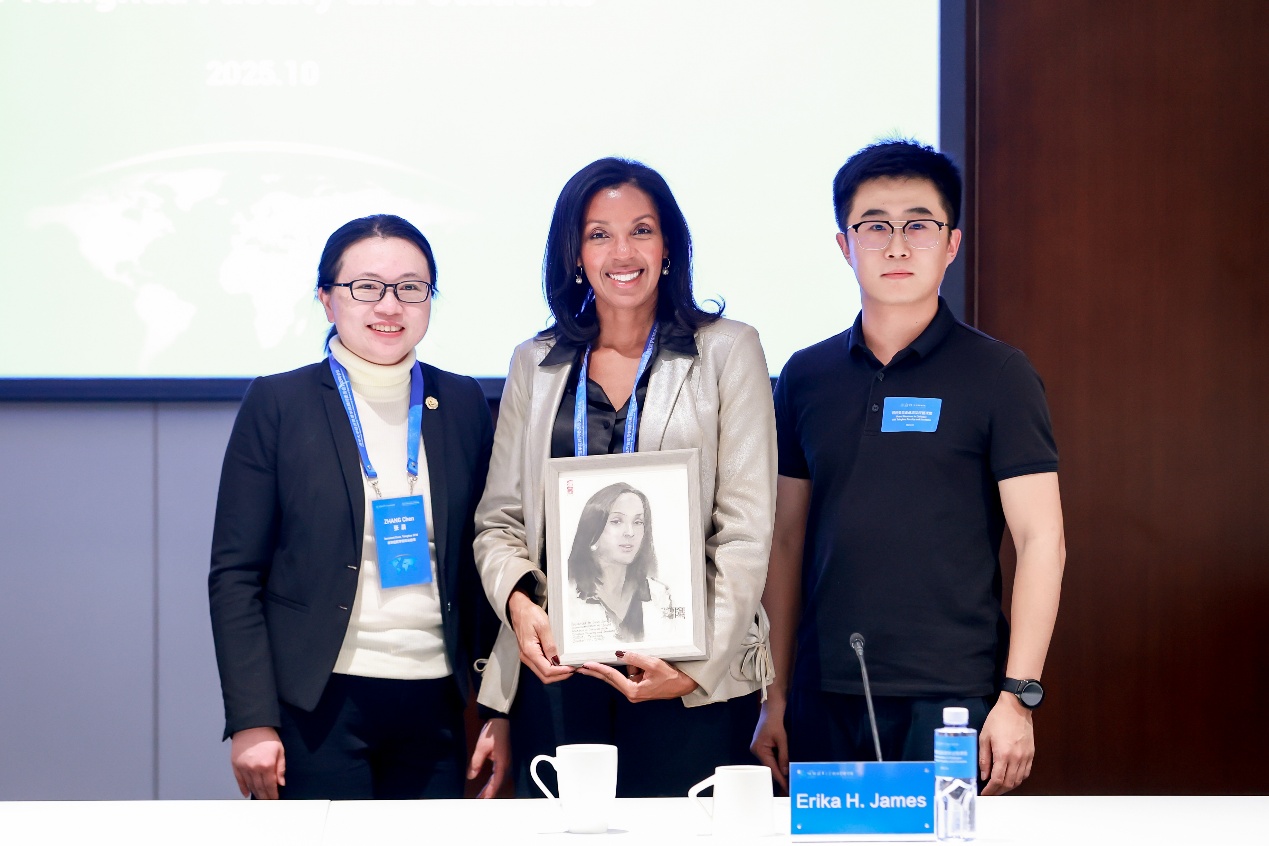
Faculty and student representatives presented a souvenir to Erika H. James
Erika H. James, a distinguished organizational psychologist, is a renowned expert in crisis leadership, workplace diversity, and management strategy. An award-winning educator, pioneering researcher, and visionary academic leader, she is widely recognized as one of the most influential women in business and education. Her book, The Prepared Leader, resonates deeply with the challenges explored during the event. Her role as an Advisory Board member for Tsinghua SEM underscores the strong collaborative bond between the two institutions.
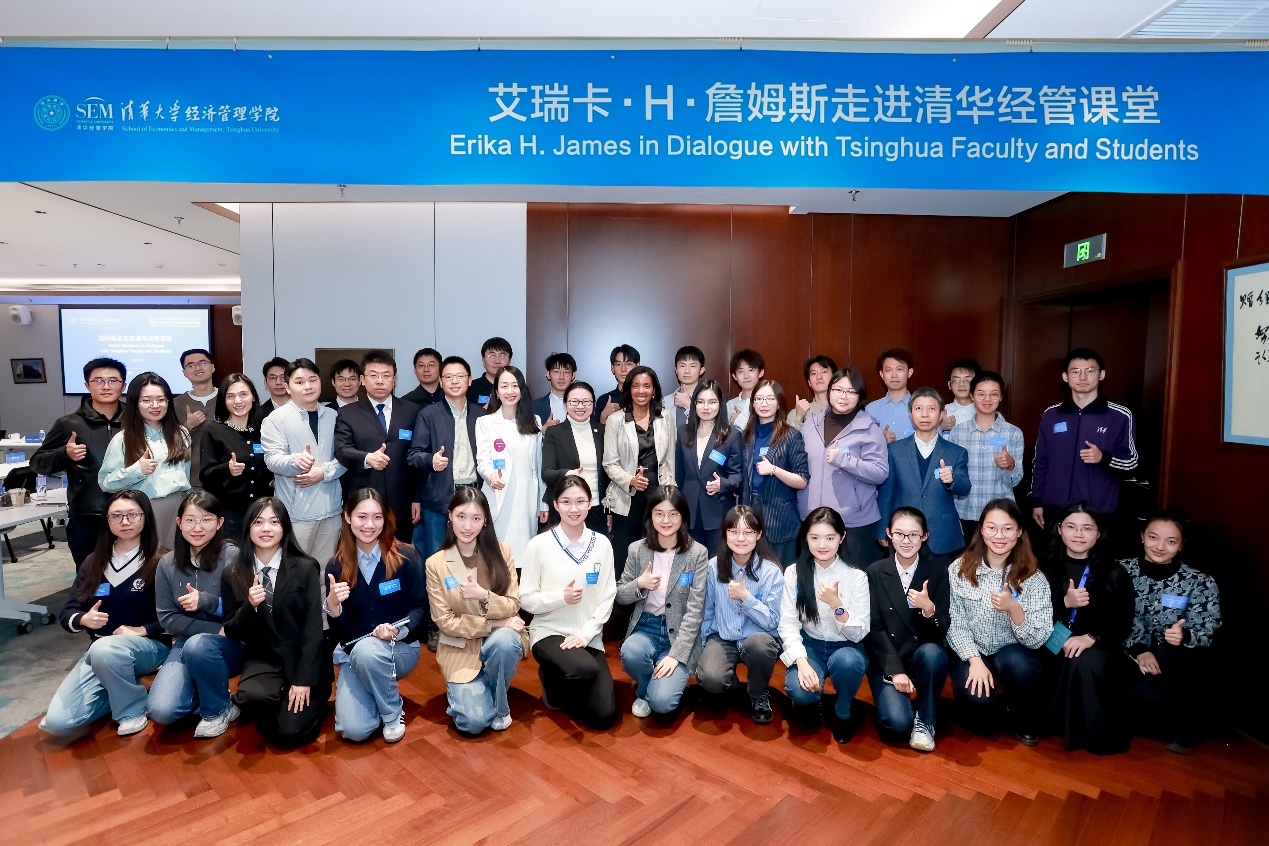
Group photo of the event
Source: Academic Affairs Office
Editor: Ren Zhongxi
 Latest News
Latest News